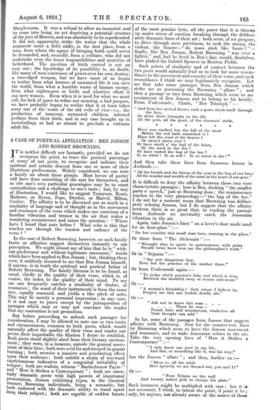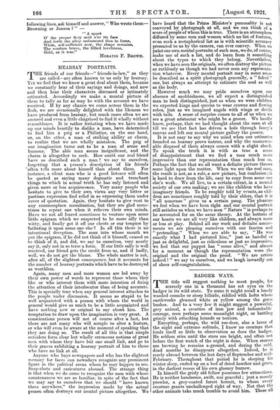A CASE OF POETICAL AFFILIATION : BEN JONSON AND ROBERT
BROWNLNG.
IT is neither difficult nor fantastic, provided we do not overpress the point, to trace the poetical parentage of many of our poets, to recognize and indicate their spiritual and artistic descent from one or more of their illustrious predecessors. Widely considered, we can note a family air about these groups. Most lovers of poetry will have done something of the sort for themselves, and to cite one's own particular genealogies may be to court contradiction and a challenge to one's taste ; but, by way of illustration, I would like to suggest Tennyson, Keats, Marlowe, or Byron, Pope, Dryden, or Marvel, Milton, Cowley. The affinity is to be discerned not so much in a similarity of language and of thought as in the movement and resonance of the verse which makes one conscious of a familiar vibration and tremor in the air that wakes a wondering reminiscence and raises the question : " Where have I heard that note before ? What echo is this that reaches me through the tension and cadence of the verse ? "
In the case of Robert Browning, however, no such family traits or affinities suggest themselves instantly to our perception. We might almost say of him that he is " with- out predecessor and without legitimate successors," words which have been applied to Ben Jonson ; but, thinking them over, it suddenly occurred to me that Ben Jonson himself, if anyone, is in truth the spiritual and poetical father of Robert Browning, The family likeness is to be found; as usual, chiefly in the quality of their verse, which is, of course, the index to the quality of their mind. To my ear one frequently catches a similarity of timbre, of resonance ; the wood of their instruments is from the same tree, equally seasoned, and yields a like pitch of note. This may be merely a personal impression ; in any case, it is not easy to prove except by the juxtaposition of passages which may or may not convince the reader that my contention is not groundless.
But before proceeding to submit such passages for consideration, I may be allowed to note one or two traits and circumstances, common to both poets, which would naturally affect the quality of their verse and render not prima facie improbable the filiation I desire to establish. Both poets stood slightly aloof from their literary environ- ment ; they were, in a measure, outside the general move- ment of their time ; both were avid for and steeped in quaint learning ; both exercise a massive and penetrating effect upon their audience ; both exhibit a strain of wayward capriciousness indicative of a congenital irritability of temper both are realists, witness " Bartholomew Fayre " and How it Strikes a Contemporary " ; both are essen- tially draniatic poets with high powers of impersonal presentation, Jenson exhibiting types, in the classical manner, Browning individuals, being a romantic, but both endowed with the dramatic ability to stand apart from their subject ; both are capable of sudden bursts of the most genuine lyric, all the purer that it is thrown up under stress of emotion breaking through the deliber. ately dramatic form of their art ; both seem, of set purpose, to drive through mere prettiness, to seek the strong, the violent, the bizarre—" do roses stick like burrs ? "- finally, 'like Ben Jonson, Robert Browning " was ever a fighter," and, had he lived in Ben's day, would, doubtless, have pinked his Gabriel Spencer in Hoxton Fields.
Such points of similarity and of contact between the two poets would naturally lead us to look for some resem- blance in the movement and sonority of their verse, and such resemblance I think we may legitimately recognize. Let me first take some passages from Ben Jonson which strike me as possessing the Browning " allure " ; and then a passage or two from Browning which seem to me reminiscent of Ben Jonson and to belong to his family. From Underwoods ; Charis, " Her Triumph " :— " And from her arched brows, such a grace sheds itself through the face,
As alone there triumphs to the life All the gain, all the good, of the elements' strife.
* *
Have you marked but the fall of the snow Before the soil hath smutched it ?
Have felt the wool of the beaver ?
Or swan's down ever ?
Or have smelt o' the bud of the brier, Or the nard in the fire ?
Or have tasted the bag of the bee ?
0, so white ! 0, so soft ! 0, so sweet is she ! "
And then take these lines from Summunt bonum in Asolando :— " All the breath and the bloom of the year in the bag of one bee,- All the wonder and wealth of the mine in the heart of one gem."
It is difficult to deny the affinity between these two very characteristic passages ; here is Ben, docking " the smaller parts o' speech," just as Browning does ; the reminiscence reaches to the very phraseology—" the bag of the bee." I do not for a moment mean that Browning was deliber- ately echoing Jonson, but I do suggest that the affinity between them is so great that, in reading the passage from Asolando we inevitably catch the Jonsonian vibration in the air.
Again, take Jonson's lines " on a lover's dust made sand for an hour-glass " :— " Do but consider this small dust hero, running in the glass."
Or these from " The Alchemist " :- "Wrought thee to spirit, to quintessence, with pains
Should twice have won me the philosopher's work."
Or in " Sejanus " :— " See yon dangerous boy,
Note but the practice of the mother there."
Or from Underwoods again :- " To judge which passion's false and which is true, Between the doubtful sway of reason and sense."
Or :- " A woman's friendship ! God, whom I believe in, Forgive me this one foolish deadly sin."
Or:— "Ask not to know this man . . . . . There he was—
Proud, false and treacherous, vindictive all That thought can add."
So far, some of the passages from Jonson that suggest affinity with Browning. Now for the counter-test, lines by Browning which seem to have the Jonson movement and resonance, and to wake Jonsonian echoes in the air. Take the very opening lines of " How it Strikes a Contemporary " :- " I only knew one poet in my life,
And this, or something like it, was his way,"
has the Jonson " allure " ; and then, further on :- "Bless us, all the while
How sprucely we are dressed out, you and I!"
Or:
" Four Titians on the wall And twenty naked girls to change his plate."
Such instances might be multiplied with ease ; but it is not necessary, I think, to labour the point, if point it be ; only, let anyone, not already aware of the source of thews following lines, ask himself and answer, " Who wrote them— Browning or Jonson ? " - " A spurt
0' the proper fiery acid o'er its face And forth the alloy unfastened flies in fume, While, self-sufficient now, tho shape remains, The rondure brave, the Billed loveliness, Gold, as it was."
HORATIO F. Bnowz.



































 Previous page
Previous page